The Rotary Nostalgia Thread
Thread Starter
And because TRC's missus has despatched him to the grocers to collect parsnips for their Sunday roast .. I have acquiesced, for the convenience of Nostalgia readers, (and so as not to disturb the aforementioned PPRuNer's household luncheon plans) to copy the article here:
F. L. Beresford making adjustments before take-off
With the approval of the Air Registration Board, the first television programme from a helicopter took place on 4 August 1956. Because helicopter flying time is expensive, much experimental work beforehand was done by simulating flying conditions in the laboratory. The main requirements were a vibrating table to shake the equipment and a loudspeaker to make ear-splitting noises.
The camera used on transmission was the standard image-orthicon, which was necessary to cope with the variable light. Unfortunately such cameras are rather heavy, so that the flying time of the Westland Whirlwind S.55 with the full load of television equipment and personnel was restricted to about forty-five minutes. The power to operate the television equipment was taken from the helicopter 24 volts supply using a technique developed for the RAF flying programme last year. As helicopters are noisy machines with a fair amount of vibration at a very low frequency, a special mount to keep the camera steady had to be designed and constructed. In addition, circuit adjustments were made in the receiver on the ground to reduce the flutter on the pictures due to the movement of the helicopter rotor blades.

Westland Whirlwind Mk III G-AOCZ (owned and operated by Westland Helicopters) with standard image-orthicon camera fitted
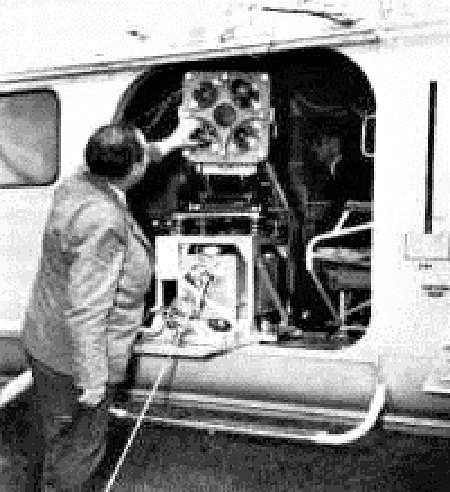
G. F. L. Beresford making adjustments before take-off
The camera used on transmission was the standard image-orthicon, which was necessary to cope with the variable light. Unfortunately such cameras are rather heavy, so that the flying time of the Westland Whirlwind S.55 with the full load of television equipment and personnel was restricted to about forty-five minutes. The power to operate the television equipment was taken from the helicopter 24 volts supply using a technique developed for the RAF flying programme last year. As helicopters are noisy machines with a fair amount of vibration at a very low frequency, a special mount to keep the camera steady had to be designed and constructed. In addition, circuit adjustments were made in the receiver on the ground to reduce the flutter on the pictures due to the movement of the helicopter rotor blades.

Westland Whirlwind Mk III G-AOCZ (owned and operated by Westland Helicopters) with standard image-orthicon camera fitted

G. F. L. Beresford making adjustments before take-off
Join Date: Aug 2001
Location: Cornwall
Age: 75
Posts: 1,307
Likes: 0
Received 0 Likes
on
0 Posts
Soggy
Would have been before that I'm pretty sure. I seem to remember the BCAL contract with the MET started in the autumn and I joined in time to do a couple of metpol flights straight after my TR on the 105 in the November I think. I will need to check the logbook which is now 1000 miles away!
G
G

Thread Starter
PPRuNed from page 64 of this thread:
As you probably know, the film's producer, Euan Lloyd, (he of 'Wild Geese' fame) was 'inspired' to create 'Who Dares Wins' by the events of the 1980 Iranian Embassy seige in London having resided not far from the scene of the action and having watched (as many did) the events unfold on TV. Much (if not all) of the aerial footage from the Iranian Embassy seige was filmed with a Heli-Tele fitted to an ex-Ferranti MBB Bo105 (G-BFYA) which was on contract to Metpol.
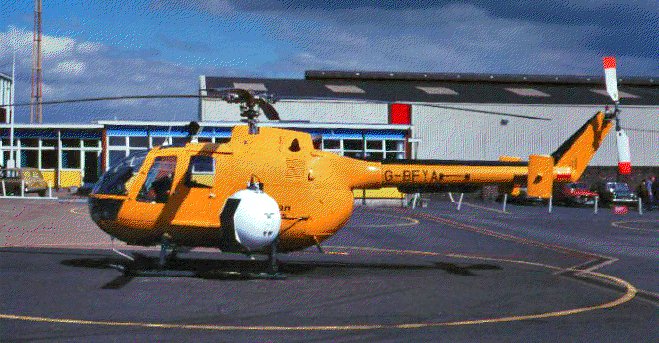
Ex-Ferranti Bo105C G-BFYA on contrat to Metpol and seen at Battersea in 1980

Ex-Ferranti Bo105C G-BFYA on contrat to Metpol and seen at Battersea in 1980
Thread Starter

Its been a while since we have seen any handiwork from Nostalgia Thread supporter and renown aviation photographer Chris England and which makes his current contribution all the more welcome:
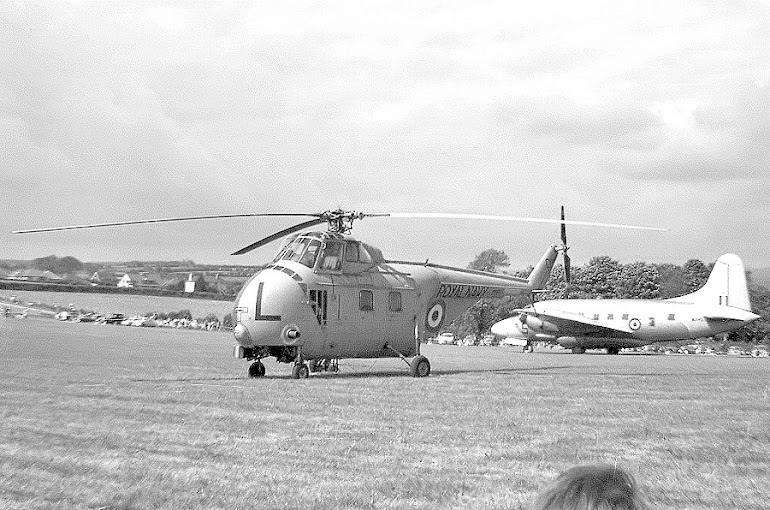
Royal Navy Westland Whirlwind HAS7 XL843 at Plymouth Roborough airport on 15th June 1963. Behind the Whirlwind is a Vickers Varsity WJ943 (Photo: Chris England)

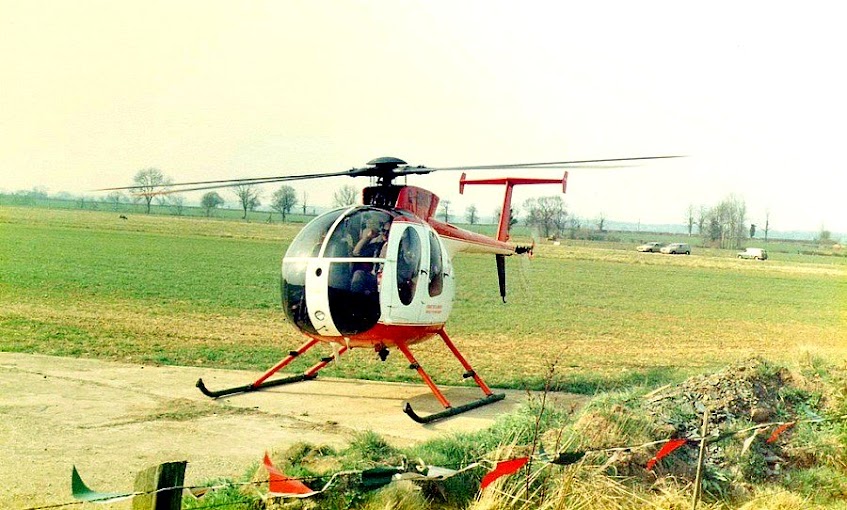
Hughes 500D G-BHST attending the Vintage Aircraft Club's fly-in at Finmere on 4th April 1982
Sadly, BHST's owners at the time of this photo (Abbey Hill Vehicle Services of Yeovil) somehow failed to maintain pressure in the ship's oleos resulting in the craft beginning to adop a hyena-like posture with her lowering hind legs!
BHST's last UK owner was 'ACME Jewellery Ltd.' of Stourbridge in the West Midlands after which she was shipped-off (in 1994) to Denmark. I had to re-read this last ownership entry because in my mind 'ACME' had always existed as a ficticious corporation employed in various Warner Bros. cartoons - noted by the way for producing an assortment of products which would fail at the most inopportune moments but, I suppose, one is free to name one's businesses as one pleases. One British gentleman for example has chosen to name his building business .. 'Titanic Construction'. One does of course wish him the best of British luck!

Thread Starter
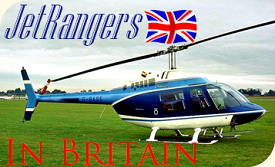

Agusta-Bell 206B G-BDBR owned by PLM Helicopters departing Edinburgh's Turnhouse Airport in May 1980 on duty for PLM client 'William McEwan's' (Photo: Robert Pittuck)
This Agusta-built 206 began life with Manfred Mann in April 1975. She was then bought by William Monks Builders Merchants of Sheffield in September of the same year. For builders merchants Monks seem to have had a fair thirst for rotorcraft. From memory I believe Dennisimo sold them at least one Enstrom and, if I remember correctly, they owned up to three JetRangers including the venerable G-WIZZ which Geoffers delivered from Agusta's Frosinone factory to Mann's base at Fairoaks.
BDBR went on to serve with Heliwork as well as 'John James Woodhouse' of Aldershot who re-named her G-JERY. She was sold to France in 1993.
You can see more of G-BDBR while under PLM's patronage in a series of photos posted by Wiggy on page 7 of the Mann Thread.
Join Date: Dec 2006
Location: swansea, wales
Age: 66
Posts: 467
Likes: 0
Received 0 Likes
on
0 Posts
Interesting Savoia, that heli BFYA was ex veritair out of cardiff, and was borrowed a few times to do the lighthouse releif at Irish Helicopters in early eighties when theirs was down for a service.
Thread Starter
Bolkow: Yes, BFYA was part of Julian's stable for almost a decade. She began life as D-HJET before being bought by Ferranti Helicopters in 1978. In 1982 she was told to my godfather's dear friend, the late John Crewdson of Helicopter Hire, who sold her on to Julian in 1986.
From Veritair she went to Sterling (1995) and finally to Alan Mann (the latter being more of a paperwork exercise than a change of ownership).
While with Julian I think she served with the Strathclyde Police and perhaps one or two additional forces.
I have images of her from almost every chapter of her career.
Another ex-Ferranti Bölkow which also chipped-in with some Police work (Sussex) and serviced a number of lighthouses was G-BAFD:
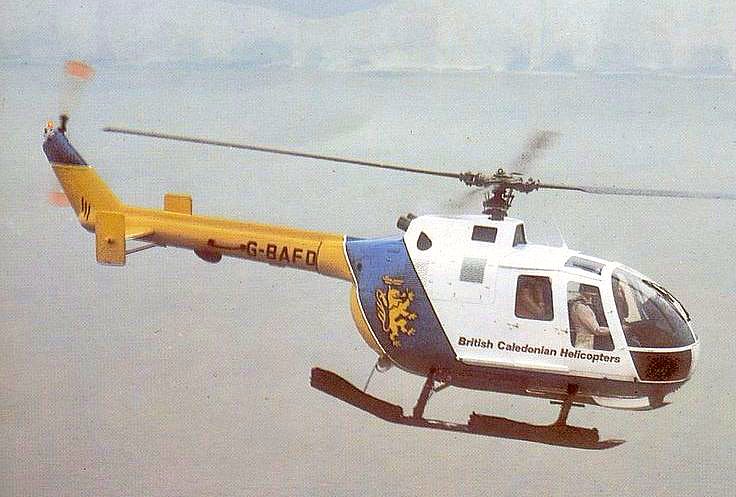
Ex-Ferranti MBB Bo105C G-BAFD en-route from Shoreham to the Royal Sovereign Lighthouse situated 6 miles south of Eastbourne
From Veritair she went to Sterling (1995) and finally to Alan Mann (the latter being more of a paperwork exercise than a change of ownership).
While with Julian I think she served with the Strathclyde Police and perhaps one or two additional forces.
I have images of her from almost every chapter of her career.
Another ex-Ferranti Bölkow which also chipped-in with some Police work (Sussex) and serviced a number of lighthouses was G-BAFD:

Ex-Ferranti MBB Bo105C G-BAFD en-route from Shoreham to the Royal Sovereign Lighthouse situated 6 miles south of Eastbourne
Thread Starter
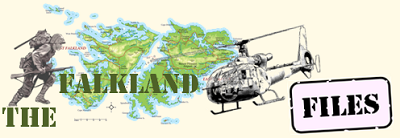
Friday, April 27, 2012
A helicopter heroine whose windscreen was holed by gunfire in the Falklands War and had her finest hour sinking five Iraqi gunboats in the First Gulf War has become the Fleet Air Arm Museum Yeovilton’s latest star. And the pilot and observer who scored that remarkable quintet were there to see Royal Navy Lynx Mk 3 XZ720 pass into history yesterday.
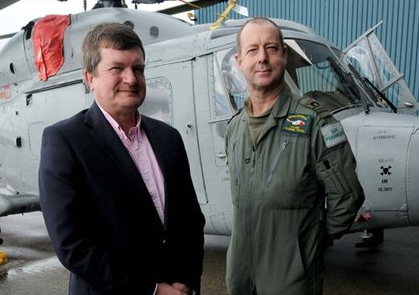
David Livingstone, left, who piloted the Lynx in the First Gulf War and observer, Florry Ford
The aircraft’s remarkable record is emblazoned on her paintwork in the five black missiles on either side of her fuselage.David Livingstone, who was the aircraft’s pilot in the First Gulf War won the Distinguished Service Cross for his actions.He and his observer, Florry Ford, then a young Sub Lieutenant, told how they earned their remarkable tally, with Sea Skua missile, while flying from the destroyer HMS Gloucester, including three sinkings in one day and a night mission under enemy attack.
Mr Livingstone, 51, of Taunton, who was a Lieutenant Commander at the time recalled: “On January 30 We were on a patrol and got a contact which was a patrol boat which the Iraqis had taken from the Kuwaiti Navy,“Under the rules of engagement we could not fire without permission to engage. Once we had that we fired and while we engaged another contact appeared from nowhere so as soon as we sank the first one we fired on the second. It was a Russian-built mine-layer.”Their third strike came that afternoon.
The next day a menacing Iraqi patrol boat appeared as the pair were supporting Americans carrying out search and rescue operations. They hit their target, while the cluster bombs of a an American A6 jet missed.Ten days later they were tasked to hunt a mine at night, under the dubious light of parachute flares when they spotted a Russian-built fleet supply vessel on its way to resupply Iraqi forces. They fired two missiles but also came under attack from two surface-to-air missiles.
Mr Livingstone took evading action, and Mr Ford warned the missiles were still on track.To avoid disaster Mr Livingstone had to fly the superbly agile helicopter within 20 feet of the sea. The enemy missiles passed just 180 feet away.The helicopter, built at Westland at nearby Yeovil joined Yeovilton-based 815 Naval Air Squadron in 1980 and saw active service with HMS Alacrity in the Falklands War, where she was on the receiving end of machine gun fire from an Argentinian gun boat.The pilot Lieutenant Rob Sleeman fortunately avoided a bullet, which came through his window screen only by turning his head.
The aircraft has been on active service until her retirement.
A special team of engineers restored her to her 1991 colours and specification. Serviceable parts were also removed for the use of the serving Lynx fleet, and replaced by others.
Yeovilton’s commanding officer, Commodore Paul Chivers, himself a Lynx Observer, accepted the helicopter on behalf of the museum of which he is a trustee.
Museum director Graham Mottram said: “We are delighted to have her, she is proof that history is a continuing process.”
A helicopter heroine whose windscreen was holed by gunfire in the Falklands War and had her finest hour sinking five Iraqi gunboats in the First Gulf War has become the Fleet Air Arm Museum Yeovilton’s latest star. And the pilot and observer who scored that remarkable quintet were there to see Royal Navy Lynx Mk 3 XZ720 pass into history yesterday.

David Livingstone, left, who piloted the Lynx in the First Gulf War and observer, Florry Ford
The aircraft’s remarkable record is emblazoned on her paintwork in the five black missiles on either side of her fuselage.David Livingstone, who was the aircraft’s pilot in the First Gulf War won the Distinguished Service Cross for his actions.He and his observer, Florry Ford, then a young Sub Lieutenant, told how they earned their remarkable tally, with Sea Skua missile, while flying from the destroyer HMS Gloucester, including three sinkings in one day and a night mission under enemy attack.
Mr Livingstone, 51, of Taunton, who was a Lieutenant Commander at the time recalled: “On January 30 We were on a patrol and got a contact which was a patrol boat which the Iraqis had taken from the Kuwaiti Navy,“Under the rules of engagement we could not fire without permission to engage. Once we had that we fired and while we engaged another contact appeared from nowhere so as soon as we sank the first one we fired on the second. It was a Russian-built mine-layer.”Their third strike came that afternoon.
The next day a menacing Iraqi patrol boat appeared as the pair were supporting Americans carrying out search and rescue operations. They hit their target, while the cluster bombs of a an American A6 jet missed.Ten days later they were tasked to hunt a mine at night, under the dubious light of parachute flares when they spotted a Russian-built fleet supply vessel on its way to resupply Iraqi forces. They fired two missiles but also came under attack from two surface-to-air missiles.
Mr Livingstone took evading action, and Mr Ford warned the missiles were still on track.To avoid disaster Mr Livingstone had to fly the superbly agile helicopter within 20 feet of the sea. The enemy missiles passed just 180 feet away.The helicopter, built at Westland at nearby Yeovil joined Yeovilton-based 815 Naval Air Squadron in 1980 and saw active service with HMS Alacrity in the Falklands War, where she was on the receiving end of machine gun fire from an Argentinian gun boat.The pilot Lieutenant Rob Sleeman fortunately avoided a bullet, which came through his window screen only by turning his head.
The aircraft has been on active service until her retirement.
A special team of engineers restored her to her 1991 colours and specification. Serviceable parts were also removed for the use of the serving Lynx fleet, and replaced by others.
Yeovilton’s commanding officer, Commodore Paul Chivers, himself a Lynx Observer, accepted the helicopter on behalf of the museum of which he is a trustee.
Museum director Graham Mottram said: “We are delighted to have her, she is proof that history is a continuing process.”
Thread Starter
Navy Days
Photographer Mike Freer has kindly contributed the following to the thread:
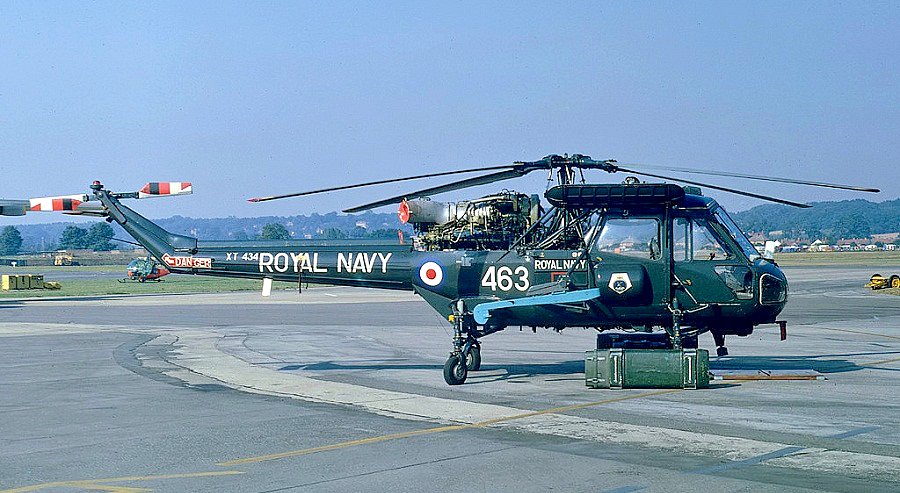
Westland Wasp HAS1 XT434 from RNAS Portland as seen at Abingdon on 14th September 1973 (Photo: Mike Freer)

Westland Sea King HAS2 XV671 from HMS Blake (converted to AEW2 then ASaC7) as seen at a rather wet RNAS Yeovilton on 28th June 1977 (Photo: Mike Freer)

Westland Wasp HAS1 XT434 from RNAS Portland as seen at Abingdon on 14th September 1973 (Photo: Mike Freer)

Westland Sea King HAS2 XV671 from HMS Blake (converted to AEW2 then ASaC7) as seen at a rather wet RNAS Yeovilton on 28th June 1977 (Photo: Mike Freer)
Thread Starter

Agusta-Bell 206A G-PMGG serial no. 8185 in the Derwent Valley, Derbyshire on 30th April 2012 (Photo: Shaun Connor)
Currently owned by Michael Gee and Paul Gallagher this 'A' model 206 seems to have begun life in Libya as 5A-BAM. From Libya she returned north to Malta where she flew with the Police Air Wing as 9H-AAJ.
From Malta 8185 was imported to the UK (1997) where she has previously flown as G-DNCN, G-PELS and G-EEGO.
Check-out the sliding pax door.
Join Date: Jan 2009
Location: around and about
Age: 71
Posts: 280
Likes: 0
Received 1 Like
on
1 Post
Early A/B 206's
Originally Posted by Savoia
"Check-out the sliding pax door."

There was also another optional fit (which I thought was rather novel); discussed at length with TRC when I joined Manns, though I think he thought I was being economical with the truth. It was an easy exercise to remove the rear seats and install a honeycomb platform with tie-down points for lashing down freight. It also doubled as a service platform with steel lanyards to screws high up on the rear fuselage, adjacent to the engine. (Very useful in the ield, on hi-skids, and that infernal, high-maintenance C18 engine)
And, I might add, the initial tailbooms were skinned with mag-alloy - and operating in that hostile environment...............

There you go, now you know too!! - VFR
Join Date: Sep 2008
Location: Cornwall UK
Age: 79
Posts: 507
Likes: 0
Received 0 Likes
on
0 Posts
Sahara Jetranger
Found on an interesting Spanish photosite....it seems the Ju-52s are from Gando(LasPalmas/Gran Canaria)

AviationCorner.net - Fotografa aeronutica - Bell 206A JetRanger

AviationCorner.net - Fotografa aeronutica - Bell 206A JetRanger
Join Date: Jun 2009
Location: South East Asia
Posts: 430
Likes: 0
Received 0 Likes
on
0 Posts
Early A/B 206's
The early AB206's (the only examples that I really got to know well) were indeed noticeably different from their Bell cousins. I remember that, a) the sheet metal skin on the rear fuselage, below the engine, was a thicker guage (I didn't know/remember about the magnesium tailboom skin), b) the rotor brake used system pressure, not a master cylinder, c) the engine anti-ice valve was activated by a push-pull cable, not an electric actuator, d) rain gutters over the doors were standard from scratch, it took Bell some time to copy this simple and highly desirable feature, e) a windscreen wiper kit was available although I only saw this a one machine, in Italy, but I cannot remember the operator and finally, f) the one difference everyone is aware of is that the pedals are embossed with 'Agust-Bell'. I'm sure there were more differences, but these are the ones that come to mind.
Thread Starter
SJ: You are quite right (as far as I remember). Some of the other variations (according to the inimitable TRC) included a hinge-mounted circuit breaker ceiling panel, a removable panel under the baggage compartment and hand-sewn leather hydraulic servo covers.
Also, Agusta began using polyurethane paint on their production 206's before Bell, in fact, many of Bell's first 'A' model 206's were delivered with a finish which was akin to a matt texture!
Yoyo: That's a great shot of the Swiss 206 (which I think may have been a Bell as opposed to an AB). The write up gives the year as 1970 and that in 1975 the craft was sold to Italy to fly as I-NYCO and where she was upgraded to a 'B' model.
Also, Agusta began using polyurethane paint on their production 206's before Bell, in fact, many of Bell's first 'A' model 206's were delivered with a finish which was akin to a matt texture!
Yoyo: That's a great shot of the Swiss 206 (which I think may have been a Bell as opposed to an AB). The write up gives the year as 1970 and that in 1975 the craft was sold to Italy to fly as I-NYCO and where she was upgraded to a 'B' model.
Join Date: Aug 2001
Location: Cornwall
Age: 75
Posts: 1,307
Likes: 0
Received 0 Likes
on
0 Posts
Bell Bells and AB Bells
One thing that Bell were quick to change was the clearance to fly in snow with the Particle Separator - they made it compulsory to use the Snow Deflectors which Agusta did not. The CAA missed this anomaly and as a result the Clyde Helicopter Bell 206B (which ran alongside an Agusta Bell 206B for a while) crashed in a snowstorm in December 1989 killing one unfortunate policeman.
It was being used to back-up their Bo105 which was on contract to Strathclyde Police. The cops had decided against helmets - 'an unnecessary expense' I seem to remember the quote went. Man dies of head injuries. Fortunately they were all wearing them when their EC135 hit the mountain one dark and cheerless night.
G.
It was being used to back-up their Bo105 which was on contract to Strathclyde Police. The cops had decided against helmets - 'an unnecessary expense' I seem to remember the quote went. Man dies of head injuries. Fortunately they were all wearing them when their EC135 hit the mountain one dark and cheerless night.
G.

Thread Starter
Herewith is the reference material for the two accidents to which Geoffers refers:
Accident summary for Bell 206 G-EYEI of Clyde Helicopters which crashed on 24th January 1990.
CAA 'Follow Up Action Report' on EC135 G-SPAU which crashed on 17th February 2002.
In both cases there was no obviously available information from the AAIB.
Accident summary for Bell 206 G-EYEI of Clyde Helicopters which crashed on 24th January 1990.
CAA 'Follow Up Action Report' on EC135 G-SPAU which crashed on 17th February 2002.
In both cases there was no obviously available information from the AAIB.
Thread Starter
Ah well TRC that's why you are there .. to sort-out those odd moments when we have a bit of finger trouble! 

The Bell YOH-4A
As most would know - the origins of the ubiquitous JetRanger are to be found in Bell's YOH-4, a prototype created in response to the US Army's request for a Light Observation Helicopter (LOH) and which request was issued on 14th October 1960.
In May 1965 Howard Hughes' YOH-6 (later to become known as just the OH-6) won the competition whereupon Bell set-out to redesign their 'OH-4' with potential civilian sales in mind.
In addition to the image problem (the craft had gained the nickname "The Ugly Duckling" during the US Army fly-offs) the helicopter lacked cargo space and only provided cramped quarters for the planned three passengers in the back.
The solution was a fuselage redesigned to be more sleek and aestheticly appealing, adding 16 cubic feet (0.45 m3) of cargo space in the process. The redesigned aircraft was designated as the Bell 206A with then Bell President, Edwin J. Ducayet, naming the craft the "JetRanger" denoting an evolution from the popular Model 47J Ranger.

Bell's first 206A mock-up (1965) - note the drop-down baggage door
Just months after losing-out in the US Army LOH fly-offs, Bell wheeled-out a mock-up of the redesigned YOH-4 (now the 206A above) and which redesign was to become the 'face' of light civilian helicopter operations for the better part of three decades.
A boot 'to boot'!

The 206A's 'spacious' boot
Keen to demonstrate (especially to the Army) the 206's new luggage capacity/cargo store, Bell sent them the above photo!
In 1969 the US Army re-opened the LOH contract because of a failure by the Hughes Tool Co. to meet its promised production quota whereupon Bell submitted its now redeisgned and redesignated 206A.
The improvements to the original YOH-4 as well as the small matter of under-bidding Hughes, ensured that the 206 won the re-tendered contract. The 206 was reallocated as the OH-58 and picked-up the name 'Kiowa' in the tradition of the US Army naming their craft after native North American tribes.
The Kiowa has been in continuous use by the US Army since 1969.

US Army OH-58 Kiowa


The Bell YOH-4A
As most would know - the origins of the ubiquitous JetRanger are to be found in Bell's YOH-4, a prototype created in response to the US Army's request for a Light Observation Helicopter (LOH) and which request was issued on 14th October 1960.
In May 1965 Howard Hughes' YOH-6 (later to become known as just the OH-6) won the competition whereupon Bell set-out to redesign their 'OH-4' with potential civilian sales in mind.
In addition to the image problem (the craft had gained the nickname "The Ugly Duckling" during the US Army fly-offs) the helicopter lacked cargo space and only provided cramped quarters for the planned three passengers in the back.
The solution was a fuselage redesigned to be more sleek and aestheticly appealing, adding 16 cubic feet (0.45 m3) of cargo space in the process. The redesigned aircraft was designated as the Bell 206A with then Bell President, Edwin J. Ducayet, naming the craft the "JetRanger" denoting an evolution from the popular Model 47J Ranger.

Bell's first 206A mock-up (1965) - note the drop-down baggage door
Just months after losing-out in the US Army LOH fly-offs, Bell wheeled-out a mock-up of the redesigned YOH-4 (now the 206A above) and which redesign was to become the 'face' of light civilian helicopter operations for the better part of three decades.
A boot 'to boot'!

The 206A's 'spacious' boot
Keen to demonstrate (especially to the Army) the 206's new luggage capacity/cargo store, Bell sent them the above photo!
In 1969 the US Army re-opened the LOH contract because of a failure by the Hughes Tool Co. to meet its promised production quota whereupon Bell submitted its now redeisgned and redesignated 206A.
The improvements to the original YOH-4 as well as the small matter of under-bidding Hughes, ensured that the 206 won the re-tendered contract. The 206 was reallocated as the OH-58 and picked-up the name 'Kiowa' in the tradition of the US Army naming their craft after native North American tribes.
The Kiowa has been in continuous use by the US Army since 1969.

US Army OH-58 Kiowa
Join Date: Mar 2011
Location: Yorkshire
Age: 70
Posts: 8
Likes: 0
Received 0 Likes
on
0 Posts
Savoia - re your post 1527.
She was reputedly used to transport one Colonel Gadaffi on occasion, although this cannot be confirmed. However, whilst in Malta, she was used as the transport for a certain Anneka Rice for an episode of the show. Sometimes I find myself just staring at that left hand seat!
Still flies beautifully.
She was reputedly used to transport one Colonel Gadaffi on occasion, although this cannot be confirmed. However, whilst in Malta, she was used as the transport for a certain Anneka Rice for an episode of the show. Sometimes I find myself just staring at that left hand seat!
Still flies beautifully.
Join Date: May 2012
Location: Essex
Age: 52
Posts: 9
Likes: 0
Received 0 Likes
on
0 Posts
Hi all, I'm new here. This is my first post. Found this place after looking for old aircraft that my Dad flew.
He did almost 18,000 hrs (as pilot) in his career (many of those helicopter) so there's a few to look for.
I thought I'd share a few pictures of some of his rides, he flew Whirlwinds in the RAF and various Bells and Hughes and others after his service.
He loved the Jet Ranger So here's a couple of shots to begin with.
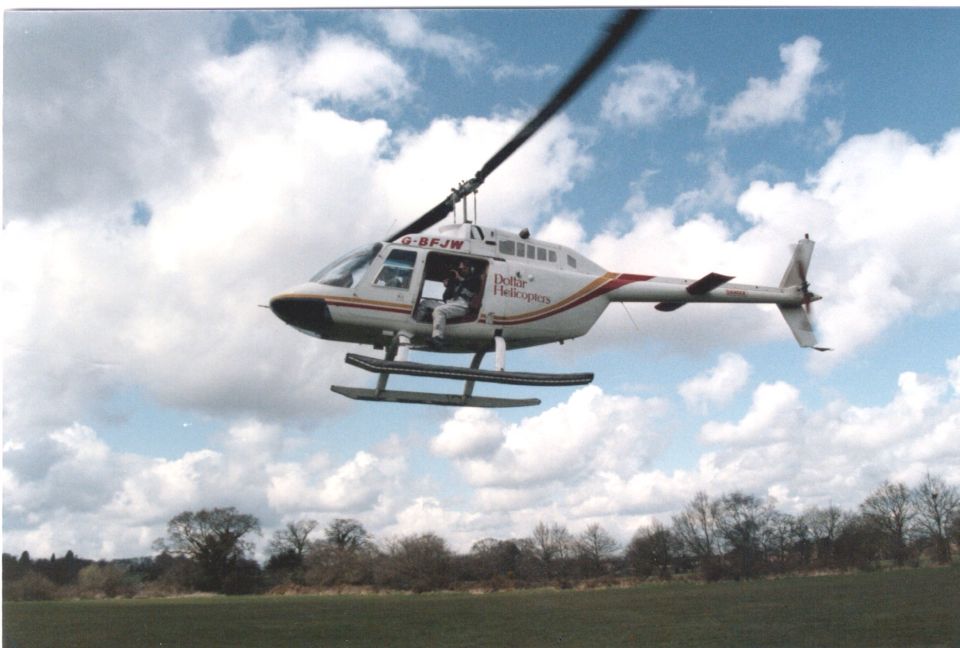
G-BFJW

G-FSDA
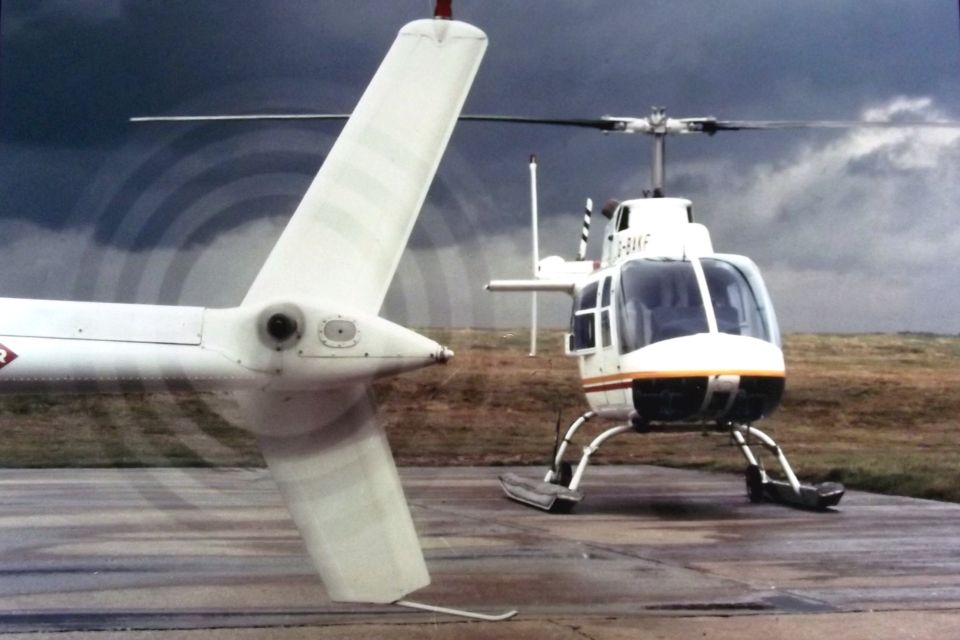
G-BAKF
He did almost 18,000 hrs (as pilot) in his career (many of those helicopter) so there's a few to look for.
I thought I'd share a few pictures of some of his rides, he flew Whirlwinds in the RAF and various Bells and Hughes and others after his service.
He loved the Jet Ranger So here's a couple of shots to begin with.

G-BFJW

G-FSDA

G-BAKF
Last edited by Wildboy; 20th Nov 2016 at 21:47.




